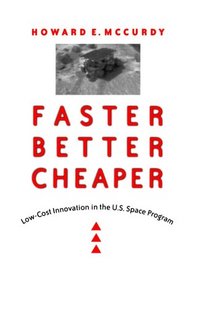

Purchase
Low-Cost Innovation In The U.S. Space Program
The Johns Hopkins University Press
October 2003
On Sale: September 24, 2003
192 pages
ISBN: 0801877490
EAN: 9780801877490
Paperback
Add to Wish List
Non-Fiction
In Faster, Better, Cheaper: Low-Cost Innovation in the
U.S. Space Program, Howard E. McCurdy examines NASA's
recent efforts to save money while improving mission
frequency and performance. McCurdy details the sixteen
missions undertaken during the 1990s—including an orbit of
the moon, deployment of three space telescopes, four
Earth-orbiting satellites, two rendezvous with comets and
asteroids, and a test of an ion propulsion engine—which
cost less than the sum traditionally spent on a single,
conventionally planned planetary mission. He shows how
these missions employed smaller spacecraft and cheaper
technology to undertake less complex and more specific tasks
in outer space. While the technological innovation and
space exploration approach that McCurdy describes is still
controversial, the historical perspective on its
disappointments and triumphs points to ways of developing
"faster, better, and cheaper" as a management manifesto.
Comments
No comments posted.
Registered users may leave comments.
Log in or register now!
| 


 © 2003-2025 off-the-edge.net
all rights reserved Privacy Policy
© 2003-2025 off-the-edge.net
all rights reserved Privacy Policy